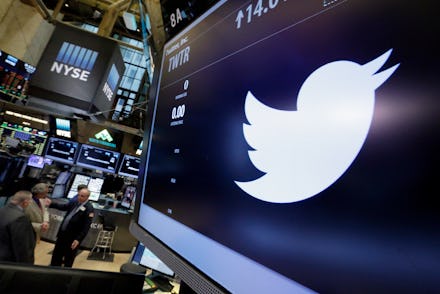Yes, millennials should buy stocks — but not based on Donald Trump's tweets

The hot new trade for amateur stock traders isn't some high-flying startup: It's whatever company the president-elect last tweeted about.
That's according to a recent survey of about 900 traders commissioned by the online brokerage E*Trade.
The company told Business Insider that more than 60% of traders ages 25 to 34 who had $10,000 or more in their accounts had traded off of a tweet from President-elect Donald Trump since the start of 2017.
At face value, that idea makes sense.
When Trump slams a particular company on Twitter, the company's share price tends to fall. You can see just how much in the below screen grab from the economist Caroline Freund.
The thing is, not everyone is getting in on the Trump-trade.
Extremely revealingly, E*Trade noted that the number of Trump traders strongly tapered off as sampling got older, and there's a simple reason for this.
Trading off of a tweet is an extremely short-sighted thing to do: There is a right way to invest in the stock market — and that ain't it.
"A stock might react negatively on some stupid tweet, but it's still about earnings and profits. The market will come back to equilibrium over time," certified financial planner Michael Kay said. "Making short-term trades on something as reactionary as a tweet has no bearing in any kind of financial prudence."
Kay noted that people who trade stocks are always looking for these kinds of competitive edges, and trading a stock based on a Twitter tirade is no different from, say, trading because the American League bested the National League in the World Series — which, shockingly enough, is also a thing some people apparently people try to do.
Roger Ma, another certified financial planner, had a more forgiving take, but also noted that he only recommends having 5% of your assets at most in individual stocks or alternative investments — which would include these kinds of trades.
"If this portion happens to include stocks that may be adversely affected by Trump's proposed policies, clients may want to re-evaluate the original reason they thought the stocks were a good investment and determine whether that still holds true." Ma said in an email. "I'd just advise clients to be more thoughtful and strategic about their actions rather than making knee-jerk reactions."
The reason? Even if you're not paying a commission or fee to trade stocks, getting the timing just right is difficult if not impossible. Even professionals who pick stocks for a living aren't particularly good at buying low and selling high.
That hasn't stopped the industry from accommodating — and arguably even encouraging — these trades. The startup Trigger recently launched a feature that notifies you in the event that a company in your portfolio has been the victim of a Trump tweet.
"This one-of-a-kind trigger notifies you when President-elect Trump tweets about a publicly traded stock that you own in real time," Trigger wrote in the announcement. "These triggers can help you capture moves or manage your holdings based on the market's reaction to the future president's remarks."
In their defense, Trigger CEO Rachel Mayer didn't necessarily recommend trading on the stock, and said she suspects that most of Trigger's users are using the tool to stay on top of their portfolios, not actually to trade.
"I definitely think sophisticated users are using it to capture new opportunities," Mayer said, "but I think the majority of people are using it purely as an informational tool to see how his tweets are affecting their portfolios and to identify trends."
E*Trade didn't immediately respond to request for comment, although their Chief Investment Officer did tell Business Insider that "what the president-elect says is much less meaningful in the longer term."
In fact, even for seasoned traders who specialize in these kinds of short-term moves, the Trump Twitter effect may be wearing off anyway, Jarrett Lilien, a veteran stock broker and former E*Trade CEO noted.
"The tweets are something to keep an eye on, but I think the impact of his tweets is declining as people ask that big question do they actually mean anything," Lilien said. "If you go back 20 or 30 years ago, CNBC was the Twitter of the day. People didn't used to have the TV set all the time watching financial news."
Now, Lilien explained, all the trading floors have TVs on in the background playing CNBC 24/7. That greatly reduces the advantage in the first place, something Lilien sees happening to the Tweets as well.
"It's just like any of these other trades, you've seen impact but as more people get in on it there's less impact."
Sign up for The Payoff — your weekly crash course on how to live your best financial life.
Jan. 13, 2016, 1:00 p.m. Eastern: This story has been updated to include comments from Rachel Mayer.
Correction: Jan 25, 2015